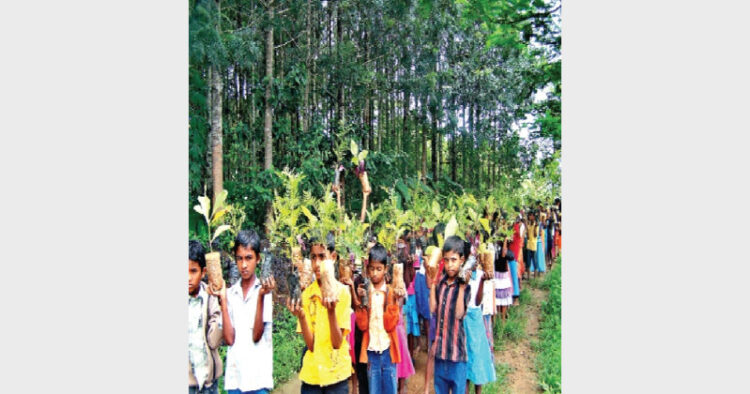At the time when many parts of the country are in the grip of severe drought, people of Anuganalu Village in Hassan District of Karnataka, about 14 km from Hassan city on Belur Road, show how to resolve the water crisis permanently. They grew dense forest at extremely rocky barren land of the village and exceptional rose the ground water level from 100 feet in 2000 to 6 feet now.
The credit for this miracle goes to two brothers of the village, Dr Malali Gowda and Krishnamurthy who moblised the villagers for the cause of nature care. Shramdaan and planting saplings in the village is now a festival celebrated many times in a year. The Biodiversity and Research Park developed in the village is regularly visited by eminent botanists and traditional doctors.
|
The foundation of this miracle was laid in 2001 when on January 26 the devastated earthquake in Bhuj claimed the lives of many. Malali Gowda, the first post graduate youth of Anuganalu, was reported to be killed in the quake. Deeply distressed villagers had even performed his post death rites. But after a few days they received the news that MG is alive. When returned to the village Malali urged the villagers, “It is indeed second birth for me. Being a genetic scientist I know the quakes or tsunamis are the curse of the nature, therefore nature should be protected at all costs, hence we should protect the nature.” His appeal influenced the villagers and they came together to materialise his words. But Planting and caring saplings on that rocky land was a herculean task, as there was no water resource. But the villagers did not lose hope. They dig small tanks on the upper areas of the plot to store rain water. They worked perfectly. As a result, there is a dense forest with about 700 species of trees, including sandalwood and innumerable natural habitation, on this land. It is also home to various birds, which were never seen even in the surrounding villages. The forest is now maintained under Biodiversity Research and Conservation Trust (BCRT), whose members are local villagers. The Trust has also distributed about 80,000 free saplings to surrounding villages and planted saplings in 100 schools.
The villagers have also developed a Medicinal Park which has more than 125 species of rare medicinal plants including Mangarbelli, Madhunashani, Rudraksh, Insulin, etc. The awareness for nature protection has generated to the extent that the villagers now celebrate their birthdays, wedding ceremonies and other auspicious occasions by planting saplings in the forest and also take responsibility to look after them. Till now about 300 such saplings have been planted. It is because of the attachment of the villagers that there is no fencing around the forest. The villagers themselves make sure that the cattle or other animals do not astray into it. The initiative has received applause not only from the environment lovers of the State, country or the nearby villagers, but also from the former President of India the late Dr APJ Abdul Kalam who in 2006 presented Karnataka State’s ‘Dr APJ Abdul Kalam Parisara Prasasti (Paryavaran Puraskar) to BCRT.
The rise in water level from 100 feet deep in 2000 to just 6 feet deep now has encouraged the villagers to turn tree plantation a movement. Now saplings have been planted on both sides of 3 km road up to end of village road.














Comments